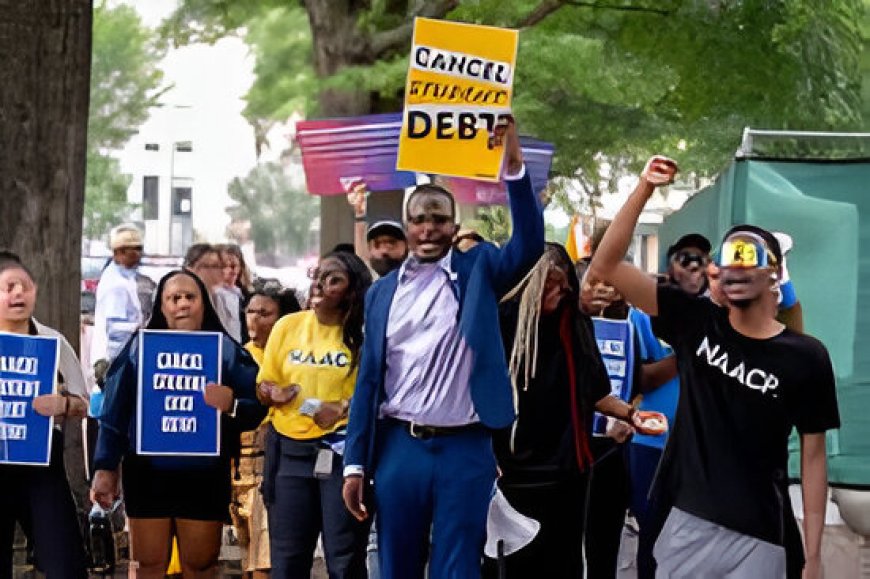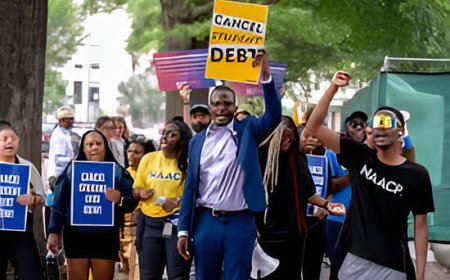Trump's Vow to End Student Loan Forgiveness Ignites Retribution Fears
Former President Trump's comments on student loan forgiveness trigger anxiety among borrowers. Experts analyze legal realities and political implications of 'retribution' rhetoric.

By Policy Correspondent | 8 July 2025
Former President Donald Trump's recent campaign statements targeting Biden-era student loan forgiveness programs have triggered widespread anxiety among borrowers, with many fearing potential "retribution" measures against those who benefited from debt relief. This emerging concern reflects deepening political divisions over higher education financing as the 2024 election approaches.
The Rhetoric: Trump's Evolving Loan Forgiveness Position
At recent rallies, Trump has sharpened his criticism of Democratic debt relief policies:
- Called forgiveness programs "reverse socialism" that rewards "elite college activists"
- Vowed to "terminate every illegal forgiveness order on Day One" if elected
- Suggested "accountability measures" for institutions promoting "radical agendas"
- A plan has been suggested to replace income-based repayment options with a fixed repayment schedule spanning 10 years.
"Why should truck drivers and nurses pay for Harvard lawyers' degrees? There will be consequences for this theft from working Americans."
Anatomy of the 'Retribution Fears'
Borrower anxiety centers on several perceived threats:
| Fear | Legal Reality | Likelihood |
|---|---|---|
| Clawbacks of forgiven amounts | Legally complex; potential Bill of Attainder violation | Low |
| New taxes on forgiven debt | Possible through legislation | Medium |
| Loss of future aid eligibility | Department of Education authority | High |
| Credit score penalties | Legally prohibited | None |
Student Debt Crisis Center reports a 300% increase in anxiety-related calls since June, with spokesperson Aaron Smith noting: "Borrowers aren't being paranoid - they've seen how previously settled rights can evaporate overnight in this political climate."
Legal Experts: Constitutional Barriers Exist
Constitutional scholars identify significant obstacles to punitive measures:
- Contract Clause Issues: Forgiven debts constitute settled agreements
- Bill of Attainder Prohibition: Cannot punish specific groups post-hoc
- Due Process Concerns: Any reversal would require individualized hearings
- Administrative Law Precedents: West Virginia v. EPA limits agency reversals
Harvard constitutional law professor Laurence Reed cautions: "While new forgiveness could be halted, retroactive punishment would face immediate injunctions. The Fifth Amendment wasn't suspended by the election."
Political Calculus: Swing State Impact
The battle holds particular significance in key battlegrounds:
- Michigan: 540,000 approval letters pending
- Pennsylvania: 23% of voters have student debt
- Arizona Young voter registration up 18% since 2023 forgiveness
- Wisconsin: 42% of forgiveness beneficiaries are over 45
Democratic strategist Rebecca Wu observes: "This isn't just about young activists - it's suburban parents who finally got relief after decades of payments. That emotional resonance crosses demographics."
The Forgiveness Landscape: By the Numbers
Current debt relief statistics reveal the stakes:
- $167B: Total forgiven under Biden
- 4.3M: Borrowers with fully discharged debts
- 9M+: Enrolled in SAVE program
- 58%: Forgiveness recipients earning under $50,000
Path Forward: Potential Compromises
Policy analysts suggest possible middle grounds:
- Grandfathering existing forgiveness approvals
- Institution-based reforms targeting high-debt colleges
- Revised bankruptcy treatment instead of blanket forgiveness
- Tax credits for low-income repayment instead of discharge
As the election nears, 43 million borrowers face unprecedented uncertainty. Urban Institute researcher Dr. Elena Martinez summarizes: "This isn't just about dollars - it's about trust in government promises. When relief can be given then potentially taken away, it creates psychological tolls beyond balance sheets."
The Department of Education continues processing applications under existing rules, while lenders brace for potential payment shocks should forgiveness programs sunset in 2025.


























